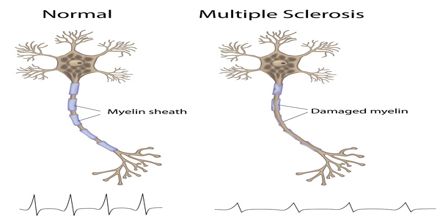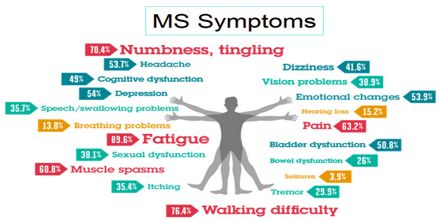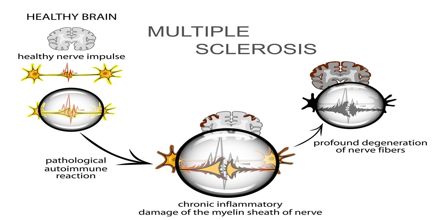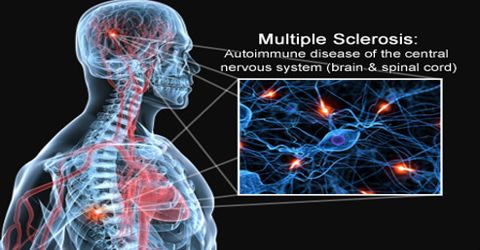Multiple sclerosis (MS) is a situation which can distress the brain and/or spinal cord, causing a ample range of possible symptoms, including problems with vision, arm or leg movement, sensation or balance. The cause of MS is still unidentified – scientists believe the disease is triggered by as-yet-unidentified environmental factor in a person who is genetically predisposed to respond. The development, severity and particular symptoms of MS in any one person cannot yet be predicted. The majority people with MS are diagnosed between the ages of 20 and 50, with at least two to three times more women than men being diagnosed with the disease.
It’s a lifelong situation that can sometimes cause serious disability, although it can intermittently be mild. In many cases, it’s feasible to treat symptoms. Average life expectancy is slightly reduced for people with MS. It’s expected that there are more than 100,000 people diagnosed with MS in the UK. It’s most generally diagnosed in people in their 20s and 30s, although it can develop at any age. It’s about two to three times further common in women than men.

Symptoms of Multiple sclerosis
The symptoms of MS differ generally from person to person and can affect any part of the body.
The main symptoms include:
- fatigue
- difficulty walking
- vision problems, such as blurred vision
- problems controlling the bladder
- numbness or tingling in different parts of the body
- muscle stiffness and spasms
- problems with balance and co-ordination
- problems with thinking, learning and planning
Multiple sclerosis (MS) facts
Multiple sclerosis (MS) is a disease that causes demyelination (disruption of the myelin that insulates and protects nerve cells) of spinal nerve and brain cells.
Although the exact cause is unknown, multiple sclerosis is measured to be an autoimmune disease.
Risk factors for the disease include being between 15-60 years of age; women have about two to three times the risk for numerous sclerosis than men.

What causes Multiple sclerosis?
MS is an autoimmune situation. This is when something goes wrong with the immune system and it misguidedly attacks a healthy part of the body – in this case, the brain or spinal cord of the nervous system.
In MS, the immune system attacks the layer that surrounds and protects the nerves, called the myelin sheath. This damages and scars the sheath, and potentially the underlying nerves, meaning that messages travelling along the nerves become slowed or disrupted.
- Infectious Factors
Since early exposure to numerous viruses, bacteria and other microbes occurs during childhood, and since viruses are well-recognized as causes of demyelination and inflammation, it is probable that a virus or other infectious agent is the triggering factor in MS. More than a dozen viruses and bacteria — including measles, canine distemper, human herpes virus-6, Epstein-Barr, and Chlamydia pneumonia — have been or are being investigated to determine if they are involved in the development of MS, but none have been definitively proven to trigger MS.
- Genetic Factors
While MS is not genetic, having a first-degree relative such as a parent or sibling with MS does extensively increase an individual’s risk of developing the disease. Studies have shown that there is a higher incidence of definite genes in populations with higher rates of MS. General genetic factors has also been found in some families where there is more than one person with MS. Some researchers theorize that MS develops because a person is born with a genetic predisposition to react to several environmental agent that, upon exposure, triggers an immune-mediated response. Sophisticated new techniques for identifying genes are helping to answer questions about the role of genes in the development of MS.
Exactly what causes the immune system to act in this way is unclear, but most experts think a combination of genetic and environmental factors is involved.

Treatments for Multiple sclerosis
There’s currently no cure for MS, but a number of treatments can help control the condition.
The treatment you will need depend on the exact symptoms and difficulties you have. It may include:
- treating relapses with short courses of steroid medication to speed up recovery
- specific treatments for individual MS symptoms
- treatment to reduce the number of relapses with medicines called disease-modifying therapies
Physical therapy. A physical or occupational therapist can teach you stretching and strengthening exercises and show you how to use devices to make it easier to perform daily tasks. Physical therapy along with the use of a mobility aid when necessary can also help manage leg weakness and other gait problems often associated with MS.
Muscle relaxants. You may experience painful or uncontrollable muscle stiffness or spasms, particularly in your legs. Muscle relaxants such as baclofen (Lioresal) and tizanidine (Zanaflex) may help.
Other medications. Medications also may be prescribed for depression, pain, sexual dysfunction, and bladder or bowel control problems that are associated with MS.
Disease-modifying therapies may also help to slow or reduce the overall worsening of disability of MS in people with relapsing remitting MS, and in people with secondary progressive MS who are still having relapses.
Unfortunately, there’s currently no treatment that can slow the progress of primary progressive MS or secondary progressive MS in the absence of relapses. Many therapies aiming to treat progressive MS are currently being researched.
















